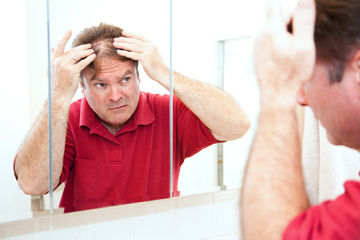If the hair follicles in your skin become blocked, a condition called Hidradenitis Suppurativa (HS) or acne inversa is developed. At first, you may notice it as pimple-like bumps on your skin. It occurs near the hair follicles where sweat glands are there. It usually occurs in the areas where your skin rubs together. Not all pimple-like bumps that develop near the sweat glands are HS. The breakout will be a painful one that causes a mixture of red-pimple like bumps, cysts, blackheads, and scarring.
There is no cure for this condition. But a healthy lifestyle and effective treatment during the early stages may help improve the condition.
Causes or Risk Factors of Blocked Hair Follicles
The exact cause of Hidradenitis Suppurativa (HS) is unknown. As a result of blocked hair follicles, the lumps develop. Usually the condition occurs after puberty and there is less chance of its occurrence before puberty and after menopause; due to this reason many people think that hormones play a role. Compared to men, this condition is three times more common for women.
An overactive immune system can also be the reason. It is known that HS is not contagious and is not linked to poor hygiene. It is reported that one-third of the people with this condition are related genetically to someone else who has it.
Other possible causes of HS are:
- Smoking tobacco
- Being overweight
- Hormone changes
- Having acne
- Having another inflammatory disease of the immune system, especially inflammatory bowel disease (IBD)
- Heat
- Sweating
Symptoms of Blocked Hair Follicles
The symptoms of HS range from mild to severe. It is a painful breakout that causes a mixture of red pimple-like bumps or boils, blackheads, cysts, scarring, and sometimes narrow channels that form under the skin that leak pus. It usually occurs in the places where your skin rubs together like armpits, groin, anus, inner thighs, and below the breasts.
The condition normally starts with a pea-sized lump that develops in one place. If these are untreated, larger lumps may develop and spread. For a man, it happens more on their genitals and around their anus. Sometimes it just comes and goes or stays the same. It might occur on the same spot every time, or may move around the body.
The symptoms can worsen if the condition is untreated, and you may tend develop:
- Bumps that burst and leak pus
- Scars that thicken
- Infections
- Deep painful breakouts that go away and come back
- Tunnels, which are tracts that connect the lumps and form under your skin
The conditions will get even worse if you have triggering factors like stress, heat, hormonal imbalance, being overweight, and smoking tobacco. The symptoms may change quickly, which means that if you have bumps leaking pus in one week, the next week the area may be cleared up.
Treatment
There is no cure for this condition, this is a recurring condition that needs constant management. With the help of treatment, flares happen less often.
The treatment:
- Reduces pain
- Can prevent complications
- Reduces the severity of breakouts
- Can promote healing
Doctors may recommend antibiotics, antiseptic washes, retinoids, biologics, steroids, hormones, pain medications and zinc for the treatment. If the condition is severe, surgery may be performed to remove lesions that grow deep in your skin.
Some healthy lifestyle tips that help:
- If you are overweight, then lose weight
- If you smoke, then stop smoking
- Wear loose-fitting clothes
- Do not shave the affected skin
- Avoid perfume or deodorants in the affected area
- To drain the pus, hold a warm flannel on the lumps
- Use an antiseptic skin wash or antiseptic soap
Once you notice painful breakouts that stay for weeks and appear in several locations on your body and return often, then consult a dermatologist. Early diagnosis is very important to make sure that effective treatment will be received and to prevent worsening of the condition. HS can be controlled with medicines in the early stages. Following a healthy lifestyle and the prescribed treatment can reduce the severity of the condition.

